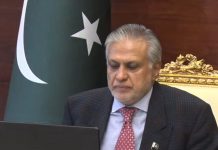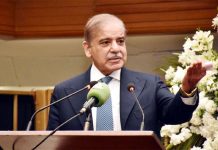-Without naming any country Shehbaz expresses gratitude to the ‘very friendly country’ for assistance before IMF deal finalised
-PM hopes negotiations with IMF to yield positive results soon
-Pakistan held 10 days of intensive talks with an IMF delegation in Islamabad from Jan 31 to Feb 9
By Anzal Amin
ISLAMABAD: Prime Minister Shehbaz Sharif on Friday expressed gratitude to a “very friendly nation” for providing as-sistance to Pakistan even before the finalisation of negotiations with the International Monetary Fund to resume a lifeline needed to avert default.
“There is an allied country of Pakistan, we were all thinking that they were waiting for the IMF agreement and then they would play their part but that allied nation a few days ago conveyed to us that ‘we are giving you [this financial help] straight away’, and these things can never be forgotten.
“There are many such sincere contributions of theirs in the past for Pakistan,” he said while addressing an apex com-mittee meeting in Islamabad.
He did not name the country, the extent of the assistance that was provided, or when the said assistance took place. The prime minister added that the IMF deal would be finalised in a week to 10 days. The prime minister said that negotiations with the IMF would soon be successful but economic difficulty would still persist in the form of “very stringent” conditions by the Fund.
Pakistan held 10 days of intensive talks with an IMF delegation in Islamabad — from Jan 31 to Feb 9 — but could not reach a deal.
The IMF, however, said in an earlier statement that both sides have agreed to stay engaged and “virtual discussions will continue in the coming days to finalise the implementation details” of the policies, including the tax measures, dis-cussed in Islamabad.
The government is in a race against time to implement the tax measures and reach an agreement with the IMF as the country’s reserves depleted to a around $3 billion, which experts believe is enough for only 16 or 17 days of imports.
The agreement with the IMF on the completion of the ninth review of a $7bn loan programme would not only lead to a disbursement of $1.2bn but also unlock inflows from friendly countries.
Thursday, President Arif Alvi signed off on the Finance (Supplementary) Bill, 2023, generally known as the mini-budget, bringing into effect tax measures which will raise an additional Rs170bn in the next four and half months to meet the last prior actions agreed upon with the IMF.
The IMF has given a deadline of March 1 for the implementation of all these measures. However, the bulk of tax measures worth Rs115bn was already implemented from Feb 14 through statutory regulatory orders.
With the implementation of all major prior actions, Pakistan is eyeing a staff-level agreement with the IMF within a fortnight which will also pave the way for much-awaited credit flows from other bilateral and multilateral lenders.
Meanwhile, regarding the security situation in the country, the prime minister said the National Counter Terrorism Au-thority (Nacta) had become a “dormant institution”.
Elaborating on the formation of the National Action Plan, he said the previous PML-N government had invited stake-holders for a “comprehensive discussion” which led to the plan’s formation.
The prime minister said he had similarly invited all stakeholders after the Peshawar Police Lines attack but “despite that, they (PTI) felt it inappropriate to arrive and till today their attempt is to resolve matters in the streets”.
PM Shehbaz said that the group still wanted to take issues to the streets, adding that there was a “full attempt to de-teriorate matters which is condemnable, especially when Pakistan is facing economic challenges”.
The apex committee meeting comes as terrorism in Pakistan has been rearing its head again. Over the past few months, the law and order situation in the country — especially in Khyber Pakhtunkhwa and Balochistan has worsened — with terrorist groups executing attacks with near impunity across the country.
Since the talks with the banned militant group Tehreek-i-Taliban Pakistan (TTP) broke down in November, the militant group has intensified its attacks, mainly targeting the police in KP and areas bordering Afghanistan. Insurgents in Balo-chistan have also stepped up their violent activities and formalised a nexus with the outlawed TTP.
Last Friday, the Karachi Police Office was attacked by TTP militants, leaving five people dead and 17 others, mostly law enforcers, wounded. Last month, a powerful suicide blast in a mosque in Peshawar Police Lines killed 84 people and injured many others.
At the meeting’s outset, the prime minister addressed the Karachi attack and paid tribute to the Sindh police, Rangers and army for the “bravery” with which they tackled the situation and prayed for the martyrs.
In a previous apex committee meeting on Feb 3, PM Shehbaz had said it considered proposals for revision of the NAP and approved a slew of measures to improve the investigation, forensics and working of the Counter Terrorism De-partment.
The committee had agreed that the federal and provincial governments would adopt a uniform strategy to eliminate terrorism and ordered an effective strategy to be prepared in this regard.




